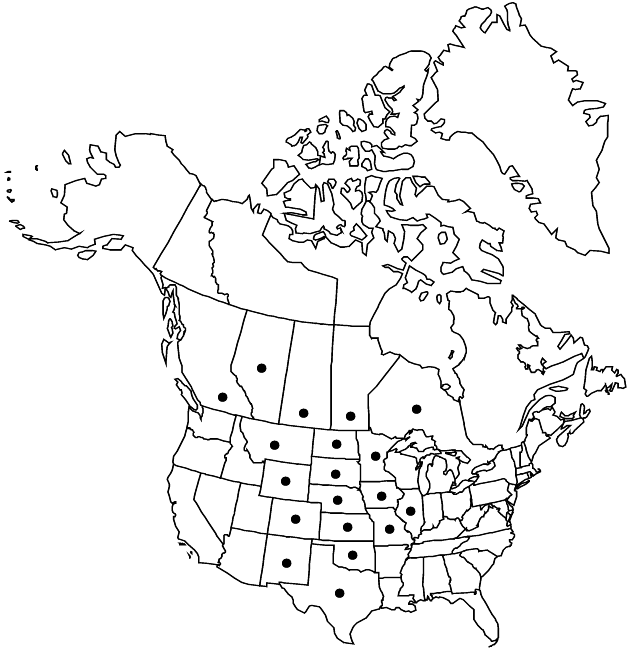familyAsteraceae
genusSolidago
sectionSolidago sect. Solidago
subsectionSolidago subsect. Triplinerviae
speciesSolidago altissima
subspeciesSolidago altissima subsp. gilvocanescens
Difference between revisions of "Solidago altissima subsp. gilvocanescens"
Sida 20: 1606. 2003.
Common names: Great Plains late goldenrod
Basionym: Solidago canadensis var. gilvocanescens Rydberg
Synonyms: Doria gilvocanescens (Rydberg) Lunell S. altissima var. gilvocanscens (Rydberg) Semple S. canadensis subsp. gilvocanescens (Rydberg) Á. Löve & D. Löve S. gilvocanescens unknown
FNA>Volume Importer |
FNA>Volume Importer |
||
| Line 15: | Line 15: | ||
|name=Doria gilvocanescens | |name=Doria gilvocanescens | ||
|authority=(Rydberg) Lunell | |authority=(Rydberg) Lunell | ||
| − | }}{{Treatment/ID/Synonym | + | }} {{Treatment/ID/Synonym |
|name=S. altissima var. gilvocanscens | |name=S. altissima var. gilvocanscens | ||
|authority=(Rydberg) Semple | |authority=(Rydberg) Semple | ||
| − | }}{{Treatment/ID/Synonym | + | }} {{Treatment/ID/Synonym |
|name=S. canadensis subsp. gilvocanescens | |name=S. canadensis subsp. gilvocanescens | ||
|authority=(Rydberg) Á. Löve & D. Löve | |authority=(Rydberg) Á. Löve & D. Löve | ||
| − | }}{{Treatment/ID/Synonym | + | }} {{Treatment/ID/Synonym |
|name=S. gilvocanescens | |name=S. gilvocanescens | ||
|authority=unknown | |authority=unknown | ||
| Line 39: | Line 39: | ||
|elevation=0–1600 m | |elevation=0–1600 m | ||
|distribution=Alta.;B.C. ;Man. ;Ont. ;Sask.;Colo.;Ill.;Iowa;Kans.;Minn.;Mo.;Mont.;Nebr.;N.Mex.;N.Dak.;Okla.;S.Dak.;Tex.;Wyo.;Mexico (Chihuahua). | |distribution=Alta.;B.C. ;Man. ;Ont. ;Sask.;Colo.;Ill.;Iowa;Kans.;Minn.;Mo.;Mont.;Nebr.;N.Mex.;N.Dak.;Okla.;S.Dak.;Tex.;Wyo.;Mexico (Chihuahua). | ||
| − | |discussion=<p>Subspecies gilvocanescens replaces subsp. altissima on the Great Plains. Tetraploids of the two subspecies are difficult to distinguish.</p> | + | |discussion=<p>Subspecies gilvocanescens replaces <i></i>subsp.<i> altissima</i> on the Great Plains. Tetraploids of the two subspecies are difficult to distinguish.</p> |
|tables= | |tables= | ||
|references= | |references= | ||
| Line 63: | Line 63: | ||
|publication year=2003 | |publication year=2003 | ||
|special status= | |special status= | ||
| − | |source xml=https://jpend@bitbucket.org/aafc-mbb/fna-data-curation.git/src/ | + | |source xml=https://jpend@bitbucket.org/aafc-mbb/fna-data-curation.git/src/8f726806613d60c220dc4493de13607dd3150896/coarse_grained_fna_xml/V19-20-21/V20_330.xml |
|tribe=Asteraceae tribe Astereae | |tribe=Asteraceae tribe Astereae | ||
|genus=Solidago | |genus=Solidago | ||
Revision as of 15:22, 18 September 2019
Involucres usually 2–3 mm. 2n = 18, 36.
Phenology: Flowering Aug–Oct.
Habitat: Dry to moist soils, disturbed soils, prairies, grasslands, near streams and ponds, roadsides, edges of thickets
Elevation: 0–1600 m
Distribution

Alta., B.C., Man., Ont., Sask., Colo., Ill., Iowa, Kans., Minn., Mo., Mont., Nebr., N.Mex., N.Dak., Okla., S.Dak., Tex., Wyo., Mexico (Chihuahua).
Discussion
Subspecies gilvocanescens replaces subsp. altissima on the Great Plains. Tetraploids of the two subspecies are difficult to distinguish.
Selected References
None.
Lower Taxa
None.